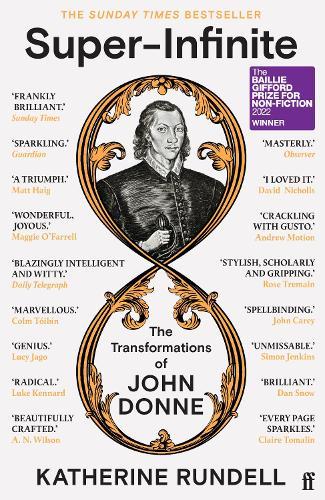FEATURE ARTICLE -
Issue 95: March 2024, Reviews and the Arts
Author: Katherine RundellPublisher: FaberReviewer: Stephen Keim
A friend and former colleague, now, a retired judge, came to my birthday party and brought a gift.
The gift, a copy of Katherine Rundell’s Super-Infinite: The Transformations of John Donne (“Super-Infinite”) was very welcome since, in my high school and undergraduate days, I had been strongly impressed by Donne’s poetic cleverness. In retrospect, my reading of Donne, like the rest of my reading which I had thought to be impressively broad and deep, turns out to be extremely shallow.
Both, in reading Super-Infinite and in, subsequently, consulting an anthology of The Metaphysical Poets, I discovered that I can only claim any significant familiarity with one or two of Donne’s poems. Perhaps, I can claim some knowledge of the Song (on woman’s infidelity) commencing “Goe, and cathche a falling starre and get with childe a mandrake root” and the contrasting Song, commencing “Sweetest love, I do not goe, For weariness of thee” which suggests that true lovers are never, in truth, departed. These two poems form both the substance and limits of my familiarity with Donne’s body of work.
And I did know that no person was an island and knew not to send to ask for whom the bell tolls.
Rundell, who is a renowned author of books for children (Rooftoppers, Cartwheeling in Thunderstorms, The Girl Savage and The Explorer), completed her doctoral thesis on Donne at All Souls College, Oxford in the years after 2008. Super-Infinite was five years in the writing but was a product of over a decade of studying and thinking about Donne and his work. Her knowledge runs very deep indeed.
Rundell takes the traditional view of a two-fold Donne: Jack Donne, the youthful rake and Dr Donne, the older, wiser priest, and rejects it as failing to capture the many different ways in which Donne expressed himself during his life.
Rundell’s Donne taxonomy includes Donne as poet, lover, essayist, lawyer, pirate, recusant, preacher, satirist, politician, courtier, chaplain to the King and Dean of St Paul’s, the finest Anglican cathedral in London. Super-Infinite, as a biography in the traditional sense, follows Donne’s life and his literary output from his earliest days to his death at the age of 59. In this way, Super-Infinite follows Donne as he transforms from one life role to another hence the sub-title, The Transformations of John Donne.
The many different roles through which John Donne expressed himself during the course of his life raise questions about how Donne should be viewed when all is done and considered. Donne was raised in a Catholic family a number of whom were considered as martyrs having died by hanging and quartering for their then non-conforming faith. Donne would have known his heroic relatives and known of their ultimate sacrifice and even his brother died an ignominious death in an insanitary prison while awaiting trial for his life for giving safe haven to a priest.
Donne took a different course to that of his brother, converted to Anglicanism and sought and, eventually, gained preferment in the Royal Court with the deanship of St Paul’s the ultimate prize. The passion of Donne’s love poems may have been reflected in his relationship with Anne More whom he wed in secret, thereby, gaining the enmity of Anne’s influential family and hostility from almost everyone influential person whose support he needed to gain positions from which he could earn a living. Thus his quest for meaningful and remunerative employment was massively set back.
Neither was the decision to marry against her parent’s wishes wonderful for Anne. She was 17 when they married and 33 when she died after 12 pregnancies the results of some of which survived into adulthood. Married life for Anne may not have quite lived up to the promises of Donne’s most famous love poetry.
When he finally received his chance, Donne was a great success as the Dean of St Paul’s having gained the position directly as a result of having been chosen by King James I. He preached many long and popular sermons which were collected and published and form an integral part of his literary heritage along with his poetry and other prose.
The story of Donne’s enigmatic life is fascinating and, as mentioned, leaves one with many questions about his personality and lovability. It is his writings which, ultimately, must matter to us most. Rundell suggests that Donne deliberately wrote poems that take all of one’s effort to untangle them. She uses the metaphor of cracking a safe. The effort is worth it, however, such that, in repayment for your work, Donne “reveals images that stick under your skin until you die”.
Rundell also stresses that, despite Donne’s obsessions with God and with death, it is the importance of people must be remembered. In a world so harsh and beautiful, it is from each other that we must find purpose. Suddenly, the statement that no man is an island comes into its own: “Every man is a piece of the continent, a part of the main … any man’s death diminishes me, because I am involved in mankind, and, therefore, never send to know for whom the bell tolls; it tolls for thee”.
Super-Infinite presents the life of a great poet. It places Donne in a context that may not make him appear to be the best of human beings but it brings understanding of his writing that cannot be fully grasped without that context. In an interview, Rundell suggests that Donne speaks beyond his time and that, just as his world was full of chaos and pain and teetered on the brink of itself, our world also so teeters such that Donne speaks to us about love and death and other matters of great relevance.



